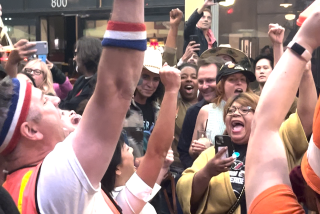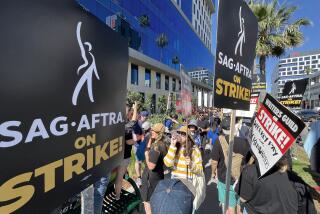NFL PLAYERS STRIKE: THE AFTERMATH : Reaction Around the NFL : Beaten Players Don’t Go Out With a Whimper
- Share via
If you thought the National Football League players were unhappy when they went on strike, you ought to hear them now.
“Some people are very, very bitter, not just here, but across the country,” said Harry Carson, captain of the Super Bowl champion New York Giants, attacking the owners for their heavy-handed response throughout the strike, climaxed by their refusal to allow Thursday’s returning players to play and be paid this weekend.
“I think they have played hardball since the whole process began,” Carson said. “It’s everyone’s opinion that they were out all along to bust the union, humble the players somewhat. It’s a little like when you have a person down, you grind on them. I think that’s what they are trying to do.”
Neal Olkewicz, the Washington Redskins’ union representative, wouldn’t even concede that the strike was over.
“We were told that we cannot play,” he said. “We will not get paid. Therefore, we are on strike again, it’s as simple as that.”
Added Redskin kicker Ali Haji-Sheikh: “What happened today is just a microcosm of what the whole strike has been about. They (the owners) tell us whatever the hell they want to tell us, and we’ve got to abide by it.”
Cincinnati Bengals player representative Cris Collinsworth, giving the strike a historic perspective, said: “It’s the end of the Civil War, and (the owners) are taking Atlanta. We’re just trying to get the furniture out before it burns, too.”
Gary Danielson, one of 16 Cleveland Browns who crossed the picket line Wednesday, accused the NFL Players Assn. of misleading striking players and “dealing in pipe dreams and promises without strategy and substance.
“We have been misled a lot,” said Danielson, 36, a 10-year veteran. “The union had cried wolf week after week after week, and I wasn’t going to buy it anymore. They said to wait until Thursday and we’d all get paid if we reported then.”
Danielson said the NFLPA is inefficient.
“I wish they would take as much energy in developing a strategy for negotiation as they do in keeping guys from crossing picket lines,” he said. “But all they do is say, ‘Don’t worry, you’ll be paid.’ They don’t understand that the NFL owners are capable businessmen.”
Once the players went on strike, Danielson said, they lost the battle.
“The timing was bad and the strategy was bad,” he said. “The atmosphere in the United States right now is pro-business and anti-union.
“As a result, we lost. We also lost friendships, team unity and fans. We also lost for other pro athletes in baseball, basketball, hockey. I don’t know how long it will take to get it all together again.”
Denver Broncos player representative Ricky Hunley declined to declare the owners the winner in the standoff.
“I don’t think anybody won,” he said. “I’ll just be happy to get back on the playing field.”
Some Chicago Bears said the wounds will need plenty of ointment to heal.
“The world is not fair,” defensive end Dan Hampton said. “If the world was fair, kids would not get cancer and owners would not treat players like pieces of meat. It’s not a sport anymore. It’s a business.”
Coach Mike Ditka said: “Unfortunately, while nobody wanted the strike, nobody seems to know how to stop it.”
More salt in the wounds: the Bengals plan to fine a striking veteran for the damage to two replacement players’ cars. The cars were scratched as they drove through a large group of pickets Wednesday morning, according to assistant general manager Mike Brown.
“This isn’t acceptable, this kind of behavior,” Brown said. “Our players have to do better than that--and they are our players, believe me. The fact they’re on strike doesn’t mean we’re divorced.”
Wes Hopkins, the Philadelphia Eagles’ All-Pro safety, ended the strike on crutches after finally defecting to have knee surgery last week. Hopkins said he believed that his teammates understood that he and two other Eagles had reported because they needed to resume their daily rehabilitation work under proper supervision, or their careers would be threatened.
Hopkins said that because of the strike, his knee had regressed, and last week he underwent an operation for removal of scar tissue. He added that the operation would not have been necessary if he had been able to continue his workouts on certain machines and under supervision.
Eagle trainer Otho Davis was asked if Hopkins would have needed an operation if there had not been a strike.
“I don’t think so,” he replied.
Hopkins said, “I’ll be in a brace 4 to 6 weeks.”
Hopkins injured the knee in the fourth game of last season and first had surgery Oct. 9, 1986. He has had three operations since, including last week’s.
In Cleveland, the prospect of returning to work without a satisfactory contract was humbling to nose tackle Bob Golic of the Browns, who remained on strike, while Sam Clancy and Carl Hairston, his colleagues on the starting defensive line, returned to work.
“We made a sacrifice for something we believed in,” Golic said. “It’s not exactly the way we anticipated it ending, so obviously I’m disappointed.”
He said the strike may have gone farther than it should have because of the competitive nature of the people involved.
“We’re egomaniacs,” he said. “Professional athletes are egotistical, and they have to be that way. To perform out there, you have to say, ‘I’m better than he is.’ Right now, a lot of these guys want to find a way to get their self-respect back. They don’t like getting kicked in the tail.”
At 1:30 p.m. Thursday, strikers Hanford Dixon, Frank Minnifield, Eddie Johnson and Chris Rockins returned to the parking lot and blasted the regulars who crossed, pointing out that Hairston and Newsome are team captains.
“What you’re seeing today is a changing of the guard,” Minnifield said. “I feel like they’re abandoning us. You’re going to see new leadership like (linebackers) Eddie Johnson and Mike Johnson. In my opinion, we need new captains.”
Owner Art Modell said he did not believe the dissension would cause any more harm to team unity than did the Denver Broncos’ overtime victory over the Browns in the AFC championship game last January.
“Winning will cover a lot of the scars, and losing causes dissension, strike or no strike,” Modell said. “There was a greater schism among our defense after the 98-yard (tying) drive by Denver than there is now.”
Modell added: “(The strike) was a theater of the absurd in which nobody has won and everybody has lost.”
More to Read
Go beyond the scoreboard
Get the latest on L.A.'s teams in the daily Sports Report newsletter.
You may occasionally receive promotional content from the Los Angeles Times.










